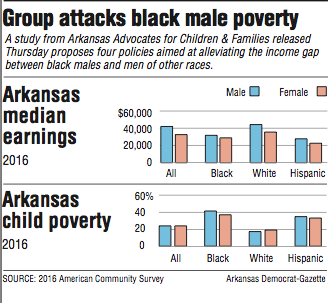Black men in Arkansas earn about $11,800 less than white men annually, a result of decades of "bad policy," according to a study released Thursday from a state advocacy group.
The study recommends four policy adjustments that could help alleviate the problem: create a state-level, refundable earned-income tax credit, revise certain legislation from the past four years, provide protection against wage theft and give more families paid leave.
Thursday's report is the first in a series by Arkansas Advocates for Children and Families -- which focuses on advocacy related to poverty, health and education -- that examines the effects of laws on black boys and men. It will conclude in June, communications director Amanda Hoelzeman said.
"This is just scratching the surface," said Eleanor Wheeler, a senior policy analyst with the group and author of the report. "This is an introduction to what the disparities are, and we are just starting to unpack and unravel the history of policies that got us to this place."
Black children are twice as likely to live in poverty as white children, the study states. That's why the study's recommendations focus on poverty, Wheeler said.
After years of missed opportunities, it has become harder for black families to build up wealth, Wheeler said.
One example is redlining in housing, she said. The term refers to the practice, once encouraged by federal housing policy, of drawing a red line around neighborhoods deemed "hazardous" to lenders and capital investment.
"That prevented certain groups from being able to build wealth through homeownership," Wheeler said.
Although redlining became illegal with the 1968 Fair Housing Act and subsequent court rulings, "that's a big one that we see having ripple effects over time," Wheeler said.
Arkansas Advocates for Children and Families' examination of how these kinds of policies have affected minority-group families started about a year ago, Wheeler said.
The group's first recommendation -- to create a state-level, refundable earned-income tax credit -- has been enacted by 24 states.
The Arkansas House of Representatives voted down a 2017 proposal to offer a state tax credit that was presented as relief for the lower-third income bracket, the Arkansas Democrat-Gazette previously reported.
Laws passed last year and in 2015 that cut unemployment benefits and expanded a drug screening program for Temporary Assistance for Needy Families Program applicants were also mentioned in Thursday's report as harmful to the black community.
Rep. Vivian Flowers, D-Pine Bluff, said she argued against the drug-testing expansion; she felt it was not an efficient use of taxpayer money. Flowers is also chairman of the Arkansas Legislative Black Caucus.
"It's counterproductive for Arkansans who find themselves in a position where they are unable to take care of themselves fully," Flowers said.
Sen. Blake Johnson, R-Corning, who wrote the bill, said it is a tool to prepare people for the workforce.
"It has nothing to do with color," Johnson said. "It's part of the workforce program, so it's not got anything to do with color or culture or anything like that."
Wheeler said wage theft also is a problem in Arkansas because the state doesn't require employers to issue pay stubs. Pay stubs would record work hours so employees could contest errors.
The study praises the Natural State as a "leader in the region" because of 2017 legislation that requires four weeks of paid leave for new mothers who are state employees.
But Wheeler said this policy should be expanded to include more working people because -- according to the study -- 65 percent of Arkansans do not qualify under a federal law that allows 12 weeks of unpaid leave.
Flowers said she would support both pieces of legislation if they were proposed.
"Where we are as a state is not something that we should continue to look at in a vacuum," Flowers said. "When we compare ourselves to other states, where we are is unacceptable, and we can't continue to ignore people, to ignore families."
Metro on 05/18/2018
